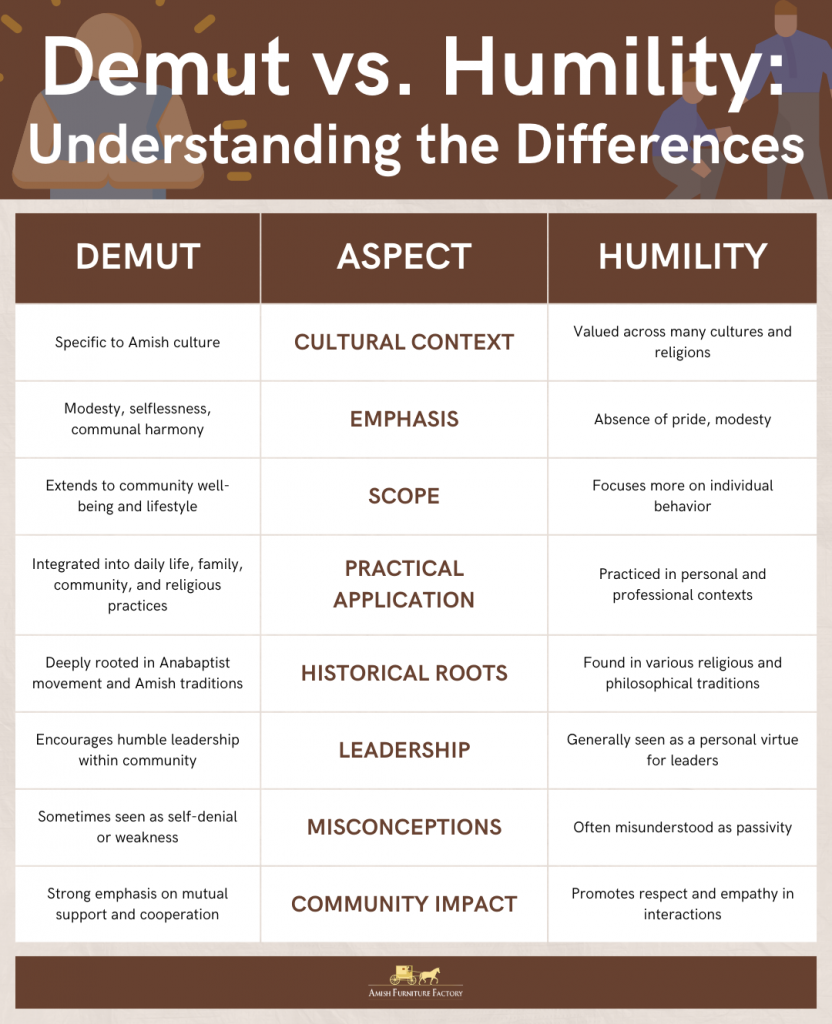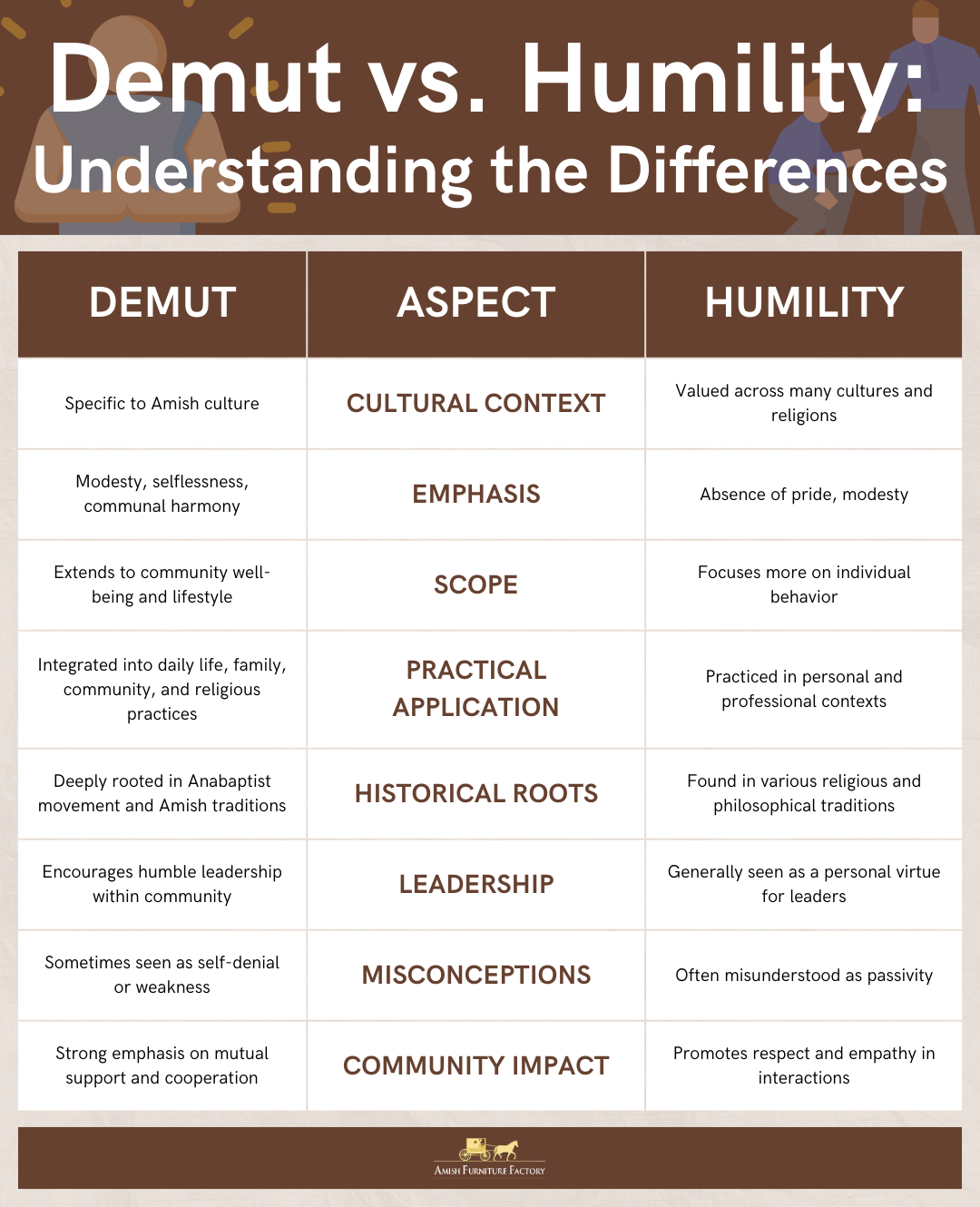
In the Amish way of life, humility is more than a personal trait; it is a fundamental principle that shapes the fabric of their community. This principle, known as demut, extends beyond conventional modesty to encompass a deep sense of selflessness, respect, and harmony. Demut influences not only individual behavior but also the collective ethos of the Amish, guiding their interactions and reinforcing their communal bonds.
Key Takeaways:
- In Amish culture, demut represents more than simple humility; it embodies modesty, selflessness, and respect, and is integral to fostering community harmony and mutual support.
- Embracing demut strengthens personal relationships, enhances emotional well-being, and promotes greater community cohesion.
- Practicing demut involves balancing humility with self-confidence, managing ego and pride, and understanding different perspectives to bridge gaps in perception.
Understanding and embracing demut can offer valuable insights into how humility can enhance our own lives and communities. This article highlights the essence of demut, its historical roots, practical applications, and the profound impact it has on the Amish way of life.
What is Demut?
Demut, the German word for humility, is central to Amish culture, embodying modesty, selflessness, and respect for others. It guides their behavior, fostering harmony by encouraging people to put others first and avoid pride. This principle strengthens community bonds and mutual support.
Since migrating to North America in the 18th century, the Amish have lived by demut, reflected in their plain clothing and simple lifestyle. Their humble approach influences their agricultural practices, community structures, and cautious use of technology, ensuring their actions benefit the community and prioritize sustainability over profit.
Demut in Religious Contexts
In Amish religious life, demut is integral, shaping both personal spirituality and communal worship. Biblical teachings, such as Philippians 2:3-4 and James 4:10, emphasize humility, reflecting Jesus Christ’s example. The Amish integrate this into their daily lives and religious practices, with church services, prayers, hymns, and sermons reinforcing humility. Rituals like baptism and communion are viewed as acts of humble submission to God, essential for spiritual growth and aligning with values of simplicity and modesty.
Everyday Practices of Demut in Amish Communities

Demut is not just a concept but a practice that permeates everyday life, guiding behavior and interactions in various settings. Here are some practical ways in which demut is applied.
In Daily Life
Demut is evident in everyday acts of kindness and consideration for others, such as prioritizing community needs over personal desires. Amish individuals exemplify this by avoiding self-promotion and focusing on collective achievements. Patience and attentive listening are also integral to practicing demut, contributing to a peaceful and supportive community.
In Family and Community Settings
In family and community settings, demut fosters unity and cooperation. Family members show respect and support for one another, and communal events involve shared responsibilities and mutual help. This emphasis on humility helps maintain harmony and cohesion in both family and broader community life.
In Conflict Resolution
Demut plays a key role in conflict resolution by promoting humility and understanding during disputes. The Amish approach involves listening to and empathizing with different perspectives, which helps to de-escalate tensions. Apologies and forgiveness are central to this process, facilitating reconciliation and strengthening community bonds.
Demut vs. Humility: Understanding the Differences
While demut and humility are similar, they are not exactly the same. Demut is a specific form of humility that is deeply ingrained in Amish culture, emphasizing modesty, selflessness, and communal harmony. Humility, in a broader sense, is a general virtue valued across many cultures and religions, involving the absence of pride and an attitude of modesty.
Demut goes beyond personal humility to include a strong focus on the well-being of the community and living a simple, unadorned life. Understanding these nuances helps appreciate how demut uniquely shapes the Amish way of life.

How to Develop Demut
Developing demut involves cultivating self-awareness, learning from community members, and practicing mindfulness and empathy in daily interactions. Here are practical steps to embrace demut.
Self-Reflection and Awareness
Self-reflection is vital for developing demut. Daily contemplation of your actions and attitudes helps identify pride-driven behavior and encourages humility. Journaling can track your progress and highlight areas for growth, fostering a more considerate approach to life.
Learning from Others in the Community
Observe and learn from respected community members who exhibit humility. Engage in communal activities to practice selflessness and seek feedback to understand different perspectives on humility. This helps reinforce the practice of demut in daily life.
Practicing Mindfulness and Empathy
Mindfulness keeps you present and aware of your thoughts, helping you recognize and adjust prideful behavior. Empathy, or understanding others’ feelings, allows you to respond with kindness and humility. Together, these practices support a consistent application of demut.
Benefits of Embracing Demut

Embracing demut brings numerous benefits, enhancing personal relationships, emotional well-being, and community harmony. Here’s how demut positively impacts various aspects of life.
Strengthened Relationships
Demut fosters stronger, more trusting relationships. When you approach interactions with humility, others feel respected and valued. This mutual respect builds a solid foundation for deep and lasting connections. Humble behavior encourages open communication and reduces conflicts, making it easier to resolve issues when they arise. Overall, demut helps create a supportive and loving network of relationships.
Enhanced Emotional Well-being
Practicing demut can significantly enhance emotional well-being. Humility helps reduce stress and anxiety, as it shifts focus from personal achievements to communal harmony. Being humble allows you to accept your limitations and seek help when needed, promoting mental health. It also encourages gratitude and contentment, which are key components of happiness. By embracing demut, you cultivate a more peaceful and fulfilling emotional state.
Greater Harmony in Community Life
Demut contributes to greater harmony within the community. When individuals prioritize the well-being of others, it creates a cooperative and supportive environment. Humility encourages fair and equitable treatment of all community members, fostering a sense of belonging and unity. This collective humility helps prevent conflicts and ensures smooth collaboration on communal projects. Ultimately, demut strengthens the social fabric, making the community more resilient and cohesive.
Challenges and Misconceptions in Practicing Demut

Practicing demut in daily life presents several challenges, often intertwined with common misconceptions. Addressing these difficulties requires a nuanced understanding of humility and its true implications. Here’s an exploration of the obstacles faced and the misconceptions surrounding it:
Overcoming Ego and Pride
Practicing demut can be significantly hindered by ego and pride, which often stem from a desire for recognition or superiority. To counteract these tendencies, it’s crucial to acknowledge when ego-driven thoughts arise and engage in regular self-reflection. Seeking honest feedback from trusted community members can help keep ego in check. Additionally, focusing on the achievements of others and cultivating a sense of gratitude can help diminish pride and reinforce humility.
Balancing Demut with Self-Confidence
Striking the right balance between humility and self-confidence is essential. Demut doesn’t require undervaluing oneself but involves recognizing your worth and contributions without seeking excessive praise. Actively participating in community activities and offering support can reinforce both humility and self-assurance. Using your strengths to help others allows you to contribute positively while maintaining a grounded perspective.
Understanding Different Perspectives on Demut
Different individuals may interpret demut in various ways, leading to potential misunderstandings. To navigate these differences, engage in open conversations about what demut means to different people, fostering mutual understanding and respect. Embracing diverse viewpoints and experiences can enrich your own practice of humility, and acknowledging and respecting various interpretations contributes to a more inclusive community.
Conclusion: Embracing Humility in Everyday Life
Demut is a foundational value in Amish life, shaping interactions and community support. It represents more than simple modesty, encompassing respect, selflessness, and a deep sense of community. Demut strengthens relationships, boosts emotional well-being, and promotes harmony within communities. Although practicing it can be challenging due to ego and misconceptions, a clear understanding of its true meaning can lead to more genuine practice.
Reflecting on actions, balancing humility with self-confidence, and appreciating diverse perspectives on demut can integrate these values into daily life. Embracing it fosters deeper connections and creates a more supportive, harmonious environment.
FAQs
What are some ways to teach children about demut?
Teach children about Demut by modeling humility yourself. Encourage sharing, helping others, and showing appreciation. Use everyday examples to highlight humility, praise kindness over achievements, and involve them in family and community activities.
Can demut be misinterpreted in outside interactions?
Demut can sometimes be misinterpreted as weakness or passivity, especially outside the community. It’s crucial to convey that true humility is a strength and a deliberate choice, not a sign of weakness. Demonstrating confidence while maintaining humility and educating others about its cultural significance can help clarify these misconceptions.
How can we balance demut and assertiveness within the community?
Balancing demut and assertiveness means expressing views and needs respectfully while valuing others’ perspectives. It involves setting healthy boundaries and standing up for what is right without being overbearing, ensuring that humility and self-respect coexist.

Considering naming my son, middle name, as Demut – As, I have read this is a Feminine noun, do you think this is appropriate?
Thanks for your input
Considering naming my son, middle name, as Demut – As, I have read this is a Feminine noun, do you think this is appropriate?
Thanks for your input
Demut would be an admirable name.
In a world of equality; names that don’t denote male/female are quite appropriate in 2018.